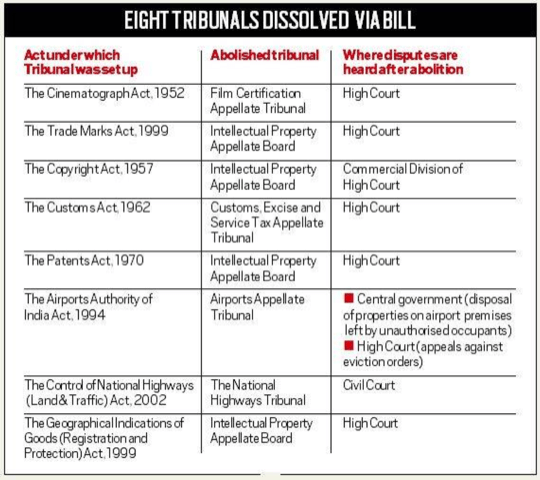[ad_1]
SC raises query on Tribunal Reforms Bill
Part of: GS Prelims and GS- II – Policies and interventions
In News: The Supreme Court challenged the government to produce material showing its reasons for introducing the Tribunal Reforms Bill, 2021.
- The SC also objected to the lack of proper debate in Parliament before it was made into law.
What is the Bill about?
- The Tribunals Reforms Bill, 2021 replaces a similar Ordinance promulgated in April 2021 that sought to dissolve eight tribunals that functioned as appellate bodies to hear disputes under various statutes.
- The bill transferred their functions to existing judicial forums such as a civil court or a High Court.
- The provisions in the ordinance regarding conditions of service and tenure of Tribunal Members and Chairpersons were struck down by the Supreme Court.
- However, the provisions re-appeared in the Tribunal Reforms Bill introduced by the Finance Minister in the 2021 Monsoon session of the Parliament.
- It also proposes changes in the process of appointment of certain other tribunals.
- It states that the central government shall, on the recommendation of the Search-cum-Selection Committee, remove from office any Chairperson or a Member, who—
- has been adjudged as an insolvent; or
- has been convicted of an offence which involves moral turpitude; or
- has become physically or mentally incapable of acting as such Chairperson or Member; or
- has acquired such financial or other interest as is likely to affect prejudicially his functions as such Chairperson or Member; or
- has so abused his position as to render his continuance in office prejudicial to the public interest.
- The Bill states that the Chairpersons and Members of the tribunal being abolished shall cease to hold office, and they will be entitled to claim compensation equivalent to three months’ pay and allowances for their premature termination.
- The government has said that analysis of data of the last three years has shown that tribunals in several sectors have not necessarily led to faster justice delivery and they are also at a considerable expense to the exchequer.
What happens to cases pending before the tribunals dissolved?
- These cases will be transferred to High Courts or commercial civil courts immediately.
- Experts fear that the lack of specialisation in regular courts could be detrimental to the decision-making process

News Source: TH
[ad_2]


